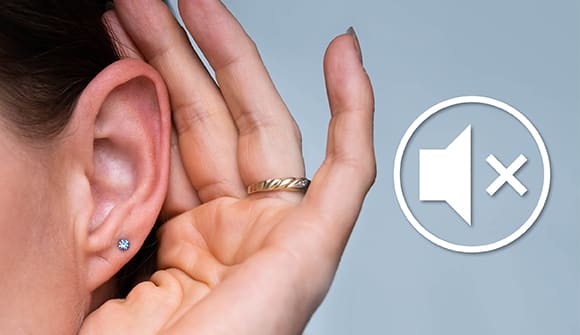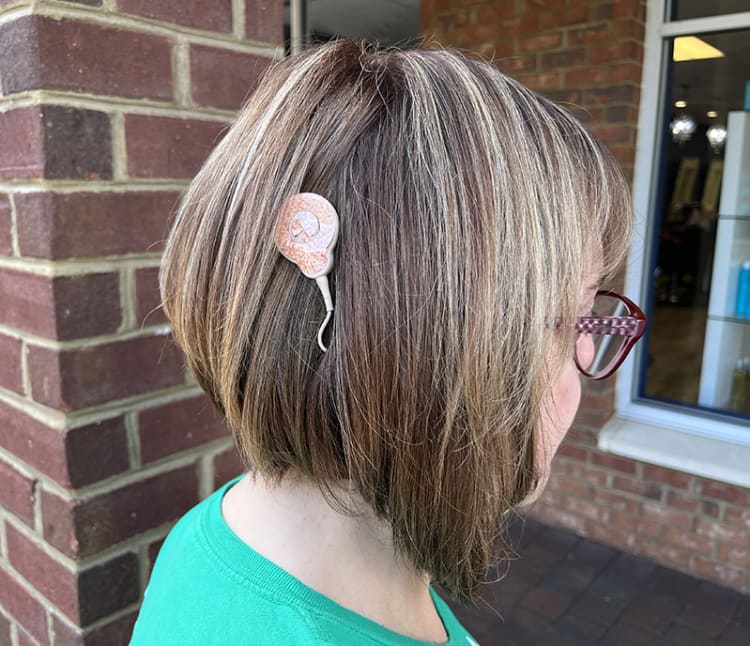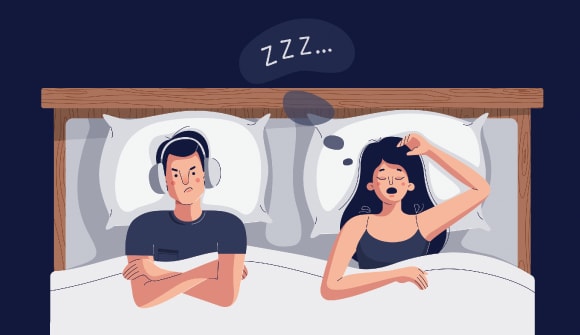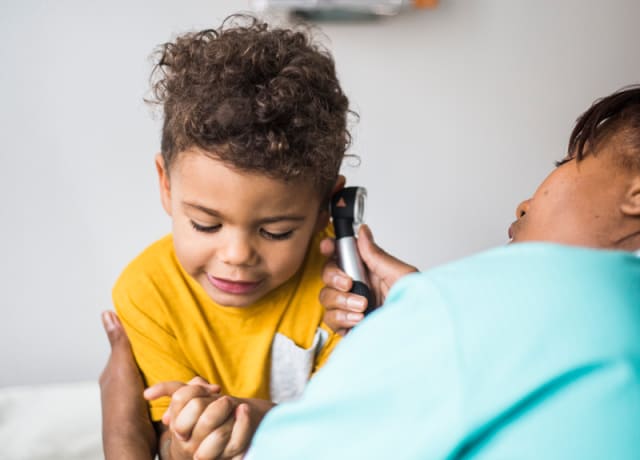A loss regained
Returning to a world of sound after hearing loss.

This first-person account was written by Vikki Mioduszewski, editor-in-chief of Juice, and manager, Marketing and Communications, Wolfson Children's Hospital.
We’ve all watched those emotional social media videos when a child, born deaf, reacts to their mother’s voice for the first time after activation of their cochlear implants (CIs). I reached for the tissues every time I saw one. Little did I realize that someday, I, too, would benefit from this amazing technology.
I was in my 30s when I realized I was having trouble hearing. I made an appointment with my Baptist Primary Care internist, Alejandro Traveria, MD, who referred me to Baptist ENT Specialists otolaryngologist, Scott Scharer, MD, for an evaluation.
Dr. Scharer examined me and ordered a brain MRI to rule out other causes of hearing loss such as acoustic neuroma, a non-cancerous tumor along the auditory nerve that can impact hearing and balance. He referred me to an audiologist for a hearing test.
A shocking diagnosis
The audiologist gave me the unfortunate news. I had bilateral sensorineural (high-frequency) hearing loss, a condition resulting from damage to the inner ear (cochlea) or a problem with the nerve pathway to the cochlea that could be genetic. It was significant enough that I needed hearing aids for both ears.
I was shocked since I was young and didn’t have a history of loud noise exposure. My audiologist also shared that this type of hearing loss would likely get progressively worse. She warned me it would probably get to the point that hearing aids would no longer provide benefit. I would eventually become functionally deaf and might qualify for cochlear implantation.
I was concerned about how my hearing loss would affect personal and professional relationships, if I would pass this on to my son, and whether it would impact my ability to work and advance my career. I wondered how my life would change as I gradually lost a sense I had always taken for granted.
Still, I plunged ahead and got fitted for my first pair of hearing aids. In the 16-plus years I’ve been wearing them, hearing aid and smartphone technology have improved significantly. Hello, Bluetooth and streaming!
Every hearing exam I had over the years showed the progression of my condition. It was a matter of time before my hearing loss would be so severe that I would need to consider a cochlear implant on one or both sides. That day came in late 2021 when I miserably “failed” my hearing test, with speech comprehension scores at 16% (right) and 32% (left). Finally, I was eligible for cochlear implantation.
What is a cochlear implant?
Unlike a hearing aid, which merely amplifies sounds, a cochlear implant processes sounds in a whole different way. With a CI, your natural hearing isn’t restored. When that’s gone, it’s truly gone. However, this small, complex electronic device bypasses the damaged structure of the inner ear and stimulates the auditory nerve to send signals to the brain that can then perceive the sensation of sound.
A cochlear implant has two parts: an external sound processor that sits behind the ear and a receiver that is surgically implanted under the skin near the ear and attached to an electrode array placed in the cochlea.
Some people have CIs on both sides, while others may only have one (which may be supplemented by a CI-compatible hearing aid). In my case, since I currently have some natural hearing on my left side, I had a cochlear implant on the right only (for the time being). My neuro-otologist, J. Douglas Green, MD, performed my outpatient implant surgery on March 17, 2022, at Baptist Medical Center Jacksonville. It was activated three weeks later. That’s not really the end of my story, but more the start of a new one.

The cochlear implant on my right side, which pairs with a compatible hearing aid on my left, is helping me return to a world of sound. A cochlear implant doesn't restore hearing but rather helps the brain process sounds differently.
Learning a new language
Cochlear implantation isn’t for everyone. According to the National Institute on Deafness and Other Communications Disorders at the National Institutes of Health, cochlear implants provide the most benefit to:
- Young children who are deaf or severely hard of hearing
- Adults and older children who developed language before they lost their hearing and get little-to-zero benefit from hearing aids
It’s not for the faint of heart! It requires a lot of work, time and motivation. Some compare it to landing in another country and having to learn a new language.
I describe my cochlear implant auditory rehabilitation therapy as “retraining the membrane” with my new "brain computer." Through creative, cool apps and exercises, practice, perseverance and regular visits with my audiologist, I am starting to regain some of what I lost, slowly but surely.
Highlights in my continuing journey have included hearing:
- The preheat alarm on my oven, from another room
- A bird sing, a crow screech, a cricket chirp and a frog croak
- My own footsteps and voice
- The ocean
- The wind and knowing that’s what it was
With my new cochlear implant, sounds aren’t the same as with natural hearing and they never will be. Some are like tinkling bells and certain speech seems robotic as my brain relearns how to process sound. Each person’s experience is different. Music doesn’t really sound like music yet, but it will.
It’s getting better all the time. And I have found a new role in my life because of my journey: hearing loss advocate.
If you are having issues with hearing loss, make an appointment with your primary care provider. If you don’t have a family practitioner or internist, please call 904.202.4YOU (4628) or request an appointment online.



